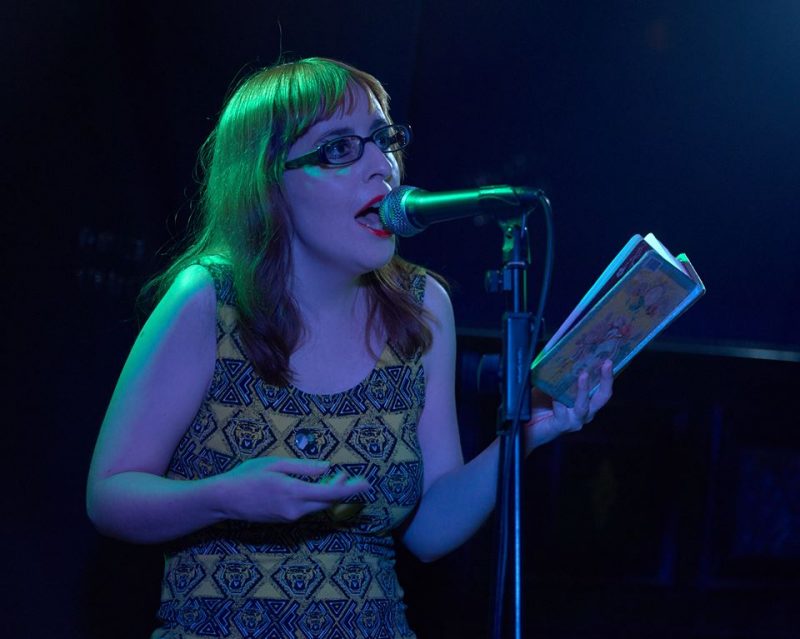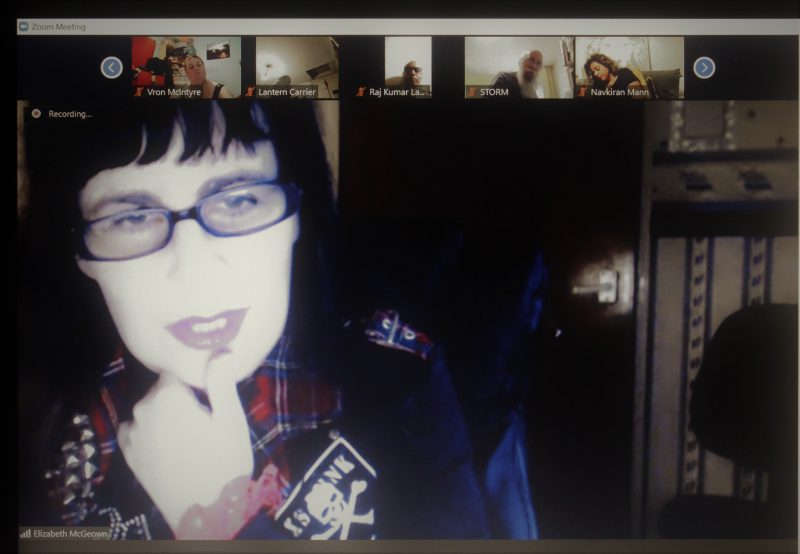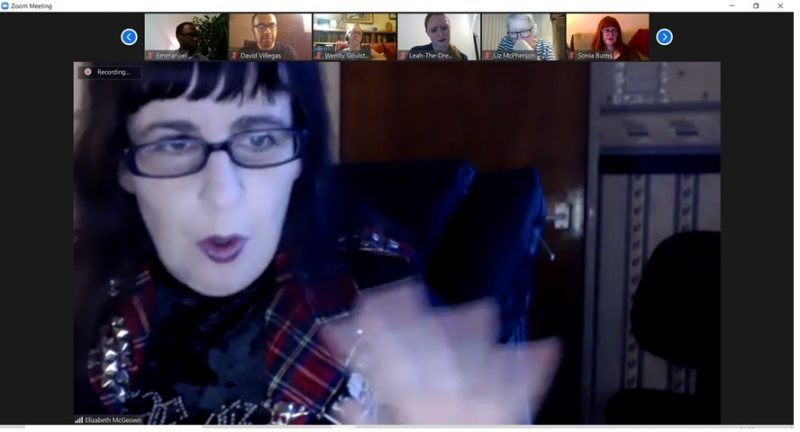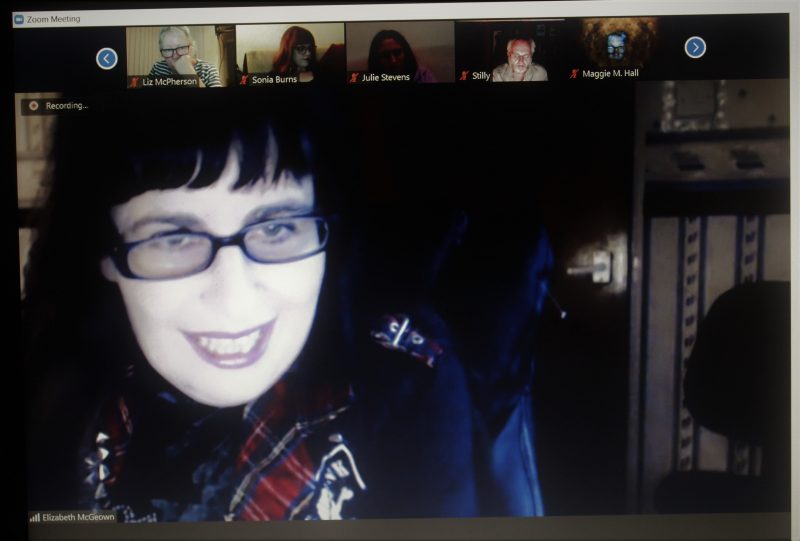INTERVIEW: FIRE & DUST MEETS ELIZABETH MCGEOWN
On telling a friend I am writing to an insect theme
and finding out months later she has assumed I meant maggots
But Maggots do not cross my mind at all:
the plump rot-seeking them of single mind.
Fat little white and wriggling shits with gall,
but Maggots do not cross my mind at all.
First time you found a dead bird, held in thrall,
turn over corpse, the bird’s eye sockets blind.
But Maggots do not cross my mind at all;
the plump rot-seeking them of single mind.
Death should be still, not undead, filled with things
which almost serve to stand the bird upright.
Excited bubbling underneath the wings;
death should be still, not undead, filled with things.
Beak opens for a squawk, this dead bird sings
a music jelly-filled, so moist, this blight.
Death should be still, not undead, filled with things
which almost serve to stand the bird upright.
___________________________________-‘Larvae’ (first published in Abridged)

Elizabeth McGeown is a poet from Belfast in Northern Ireland. She has been published in journals including Banshee, Abridged and Riggwelter, and in the anthology Planet in Peril (Fly on the Wall Press, 2019). She is also featured in Wave Four of iambapoet.com. Additionally, she is an All-Ulster Poetry Slam Champion, a finalist in every All-Ireland Slam since 2016, and represented Northern Ireland at the Royal Albert Hall in the Hammer & Tongue UK Slam Championships (2019 and 2021). She won the Cúirt International Festival of Literature: Spoken Word Platform 2019 and the Cursed Murphy Spoken Word Prize 2019. In 2021, she was longlisted as ‘Best Spoken Word Performer’ in the Saboteur Awards. She is funded by the Arts Council of Northern Ireland and University of Atypical to work on her first book, which will be released by Verve Poetry Press in 2022.
On 5th August 2021, Elizabeth was the guest headliner at our Fire & Dust poetry night. We caught up with her after the event, to ask a few questions…
HCE: Tell us a little about your background and journey as a writer so far. What inspired you to start creating and performing poetry?
EM: I always read a lot, and wrote. Writing was probably the first thing I wanted to do, from around three years old. I wrote little stories and plays but when I got a bit older I stopped. I think I’d convinced myself (or someone else had convinced me) that writing and being a dreamer was unrealistic, especially in secondary school. When I left school the desire to write and perform gradually came back and I joined theatre groups and sang in bands. I kept a diary. When I discovered the internet, I had a blog and moved into gig reviewing, reviewing for some well-respected Irish websites. Eventually the desire to perform and to write converged and I began to write lyrics. When some of the bands I was in split up I realised how frustrating it was to work with people who didn’t take your ideas on board if you were ‘just the singer’. I wanted to be self-sufficient. A friend of mine had been doing some performance poetry gigs so I was vaguely aware of it. I had never liked poetry, but liked the idea of solo performing so decided to give it a try. Turns out I did like poetry!
HCE: Who is your work aimed at – do you have an ideal audience in mind when you’re putting a poem together?
EM: I just hope that I’ll find the people or even just the one person who it resonates with, who needs to hear it. I never know what that person will look like and I have often been surprised by who comes up to me afterwards and what they say. Having said that, I speak a lot about Feminism, mental health, disability and identity, so I’ve found over the years that my work seems to resonate more with women, or people who are not cis men. For a long time it seemed that people in their 20s and younger felt more of an affinity with my writing but I have found responsive people outside all of these categories. The message being, I guess, not to categorise people! So my ideal audience is a kind audience that listens, responds and gets all the weird niche references I put in the poems.
HCE: Would you say there are themes or motifs that you gravitate to in your work?
EM: Yes. I have preoccupations that surface and resurface in different ways as I turn them around in my brain and re-examine them. I write about being silenced a lot, and with the benefit of hindsight I’m trying to examine silencing and gaslighting techniques that I can recognise now, in an attempt to help others recognise them. I’m fascinated by the moments when a conversation goes wrong, power dynamics in conversations and ‘sliding doors’ moments we all have when our lives could have changed if we had taken a different path. I spent a lot of time alone as a teenager so I got into the habit of spending more time with fiction than with humans, so I like to use the lens of fiction (books and cinema) to examine my experiences. Lockdown has reminded me of that period of isolation so I’m examining isolation, memories and regret a lot at the moment.

HCE: One of the poems you shared at Fire & Dust explored the issue of lacking confidence as a performer. Did you have to overcome a lot of nervousness when you first started out? Any tips for other poets on how to shake off the nerves at gigs?
EM: I still have to overcome nervousness now! Or I try to. It depends on the scenario. My work is better now, so I feel more comfortable (although I liked my poems at the time, for the most part) and I’ve found audiences and gigs that actively enjoy the poems. At the start there was an element of selling your wares to everyone and having no idea who would like it. Doing mixed bill cabarets, having to share stages with comedians, open mics and being worried you’re boring the audience. The knowledge that you have been booked to just be you is very comforting. I also have some successes behind me which I find really bolsters my confidence when I need a lift. Solid memories that I can recall and think ‘That thing happened, and it is evidence of the fact that those people liked my poems on that night.’ But I worry still, about forgetting my words, about not doing my words justice. The best way to feel less nervous about forgetting words especially is to rehearse. It’s tedious, it takes discipline and involves a lot of talking to yourself but honestly, regular rehearsal rather than just the week before a gig helps the words stick in your head more. I need to take my own advice on that!
HCE: How did it feel winning the All-Ulster Slam? Do you enjoy competing in slam events?
EM: That was the first slam I ever won and you know, I wasn’t sure I ever would. In 2016 I was struggling a little with feeling like I wasn’t getting anywhere (even though I only started writing poetry the year before) and would never win a slam but then I travelled to Dublin and placed second in one so I realised it’s as much about the judges and the place than it is the poems. I decided to travel more and the All-Ulster was part of that, as I had to travel to Derry to get through the qualifier and Enniskillen for the final. I wasn’t sure if I was on a fool’s errand. Winning it meant I was Northern Irish slam champion and could compete in the All-Ireland final, so I realised there were possibilities outside Belfast, and began to believe in myself.
I’m honestly not sure how I feel about slams! I must enjoy them as I keep doing them but I’m conflicted. They’re good for discipline: they focus your mind on learning your words and most of my really focused periods of revision and memorising has been before a slam. You need to take them with a pinch of salt though. Winning is lovely, especially if there’s a very nice prize but if you get voted out first you can’t take that too much to heart. If you keep doing the same poem and it keeps doing badly, maybe it isn’t an amazing poem but if you do the same poem at three different slams and you place differently in each…it’s the judges. It’s subjective. What I did a little during lockdown was watch some slams I wasn’t invested in at all. I was just an audience member. I found that usually, the person I wanted to win didn’t (and I think I have pretty good taste!) which shows that in most circumstances, there is no ‘best’ and no ‘worst’. There’s just a judge who gave you a high score because they like poems about biscuits and scored someone else low because they didn’t like penguins.
HCE: You remarked at Fire & Dust that your poems tend to be quite lengthy. Is this a problem when it comes to the time limits of slams – do you have to create shorter adaptations of your work?
EM: Definitely. For some reason, lots of my finished pieces seem to settle at around the five minute mark. I don’t know why, that just seems to be my natural stopping point. And some of the longer ones are my favourite pieces. When I started out, my scope was less ambitious so I wrote a few things that would squeeze into three-minute slots but I love setting the scene for a story too much to be able to do that regularly. So, at slams I find I have to gravitate towards older pieces which aren’t necessarily representative of the rest of my work. I do have a few poems that I managed to make neat three-minute edits of, but it’s a tricky task that involves memorising two versions, remembering which version you’re doing at the time and speaking at the right tempo. Some poems are just uncuttable. Not because my writing is so amazing, but because making a slam edit would just remove so much context that they wouldn’t make sense. For these reasons I prefer feature sets, as it gives the audience more of an idea what I’m really about and where my interests lie.
HCE: Some of your poetry deals with serious subject matter in a direct and honest way. Is this an emotionally draining thing to do? What is the top piece of advice you would give other poets for tackling heavy/personal topics in their writing?
EM: I personally don’t find it emotionally draining, because these are things I need to talk about and I love exploring different angles of situations. I have a methodical personality that means I can detach from certain things enough to create art from them and a lot of difficult things I’m currently exploring via poetry happened more than ten years ago. I know others do find it draining though. I would advise people not to talk about matters publicly if they don’t feel ready. You can write some poems and keep them to yourself for years. You can write some things for yourself and never show them to anyone. Don’t bring something out too early and especially not for reasons of seeking approval, wanting to be liked or wanting to win something. Your writing group corrected your grammar in your trauma poem and you started crying? Or you’re trying to impress a poet you admire. If they aren’t impressed, will you regret sharing the poem? Then don’t share it. You’re trying to do well in a slam and you think your most anguished poem will help. You get voted out in round one. Do you regret opening yourself up like that? Then don’t share it.

HCE: In what ways do you think growing up in Belfast has shaped your experiences and writing? Does the city have a thriving literary scene?
EM: It does and it doesn’t. Belfast is full of writers. Songwriters, fiction, poetry. The poetry MA at Queen’s University is meant to be excellent and our writers regularly find publication with Irish and UK presses. But performance poetry/spoken word is still seen as something of an oddity. I have always been welcomed at local events and the hosts (at Purely Poetry open mic especially) have been so kind to me but I felt slightly out of place. That could be just my perception and social awkwardness, of course, but it wasn’t until I started going to Dublin events in 2015 that I heard people doing what I was trying to do, and then the Edinburgh Fringe in 2016 cemented that. I was aiming for something that, for whatever reason, I wasn’t being surrounded with and I only ever found it when I left my city.
Of course, this has an upside. This means that for the most part, my inspiration comes from inside my own head without being overly influenced by ‘poetry voice’ or the ‘next big thing’. I’m not exposed to a lot of well-known poets so I just make it up as I go along. My voice is mine and it’s proudly Belfast. Literally, in terms of accent, as well as figuratively. I speak about growing up here and even when I write about other things lots of people remark on my dark humour, in poems where they wouldn’t expect a joke. That’s a Belfast thing, I think. Horribly sarcastic, at all times. I’m working class, I take the bus, I listen to conversations around me, I watch, I learn. I think I’m pure Belfast.
HCE: What type of poetry do you seek out for personal enjoyment? As a reader/listener, when you engage with a poet’s work, what are you hoping to get out of it?
EM: Listening to poets will probably always be my first love and I really enjoy the intersection between poetry and storytelling, like the simple, bittersweet tales of John Osborne. They make me think a lot about linear story construction. I like long-form work that tells a story. A particular love of mine is that moment where a poem suddenly ‘takes off’ though. It becomes something special even though you can see all the individual ingredients, but the recipe is a mystery and you can feel your brain marvelling at it. Joelle Taylor’s sets (which I have only seen on Zoom) are like that. I recently discovered Ross Sutherland too and there are elements in his audio-visual work where the pieces suddenly take flight and go beyond.
I only really started reading poetry books around two years ago and a favourite of mine is Fiona Benson who crafts narratives of fear and shame in such a detailed fashion they really lift off the page. I’m eager to read Abi Palmer’s ‘Sanatorium’ soon after seeing the show online.
All of these writers, in whatever medium they were working in, did something that made a little light go off in my brain. The light hasn’t done anything yet but it’s ticking away. It’s preparing something.
HCE: We loved your poem about the vital wonder of literature and fictional worlds. Which authors would you say are the biggest influences on your own writing?
EM: This is where I turn into a big Stephen King weirdo! Because I didn’t start reading poetry until fairly recently most of my influences are novelists. I love Stephen King for character construction, naturalistic dialogue and other, smaller things like inner monologues, repetition, worldbuilding. I’m also a big fan of the decadence of Clive Barker and Anne Rice. Did any of these authors influence my writing? I’m genuinely unsure. I think they probably added to my inner landscape which in turn influenced my writing. I’ve recently discovered some poetic prose by authors like Max Porter and Elizabeth Strout and I’m beginning to be curious about verse novels so I have the feeling a lot of these influences are going to come together for some future projects.
HCE: In the aforementioned poem, you touched on subverting the rule ‘write what you know’. Would you say there’s a balance to achieve, between writing about personal stuff and being more imaginative/surreal, or should we avoid the ordinary in our poems as much as possible?
EM: Gosh no, you shouldn’t avoid the ordinary at all! Unless you want to, of course. I enjoy the surreal and I wrote that poem when I was trying to unlock something in my own brain: I was trying to get myself away from typical kitchen sink stories that everyone writes as that’s not where I’m happy so that was a call for arms to me, to remember the people and books who had raised me. But the ordinary can be a fascinating place. Without writers who focus on it we wouldn’t have the films of Ken Loach or any number of television soaps, many of which I enjoy! I enjoy a mixture of the two, personally. I like a little magic but I’ve noticed a current poetry trend for work to be so steeped in the surreal that I can’t pin down where the image came from or what the writer’s trying to say. Do I necessarily have to pin it down? No, but without grounding in reality a poem loses me.
I will say though that I don’t think writing about personal stuff has to be ordinary. I’ve written about several personal things in ways that hold magic for me, even though they might not have happened that way originally. You can describe the feeling while rejecting the scenario. Write your own magic, whatever it is.

HCE: It’s not a simple question to ask or answer in 2021, but…what is next on the horizon for you? Are you already working on projects/booked for upcoming performances?
EM: The main thing is the book! I will have my first full collection ‘Cockroach’ published by Verve Poetry Press in 2022 (supported by Arts Council of Northern Ireland) so I’m working away at that. I believe the essential structure of it already exists, but if I can think of any ways to improve that I will absolutely do so. The book will also work as a companion piece to my one-person show which I plan to take to the Edinburgh Fringe in 2022. There’s a limit to what I can fit in the show time-wise so the book will fill in some blanks, explore some stories more thoroughly. I will be hosting a virtual work-in-progress of the show as part of the PBH Virtual Free Fringe on 26th August, tickets free on Eventbrite but donations on the night would be very welcome! I’ll be sharing that from my own living room so it will be very different from the finished article. I’m excited to see what it will be like with direction and staging in the future!
I also have a couple of gigs coming up. Real-life gigs are still very much up in the air but I’m in episode 4 of The Candlelit Sessions on 27th August curated by Kathryn O’Driscoll. It’s a night of mental health poetry also on the PBH Virtual Free Fringe. I’m joining Ó Bhéal virtually for Cork Culture Night on 17th September as a featured poet, along with Jenny Lindsay. I also might be starting an MA in Creative Writing in late September but it’s not set in stone. I’m considering deferring for financial reasons and Covid reasons!
HCE: What’s the best way for people to keep connected or contact you for bookings?
